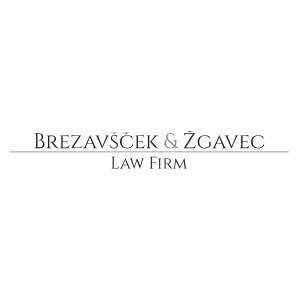Best Landlord & Tenant Lawyers in Ljubljana
Share your needs with us, get contacted by law firms.
Free. Takes 2 min.
Free Guide to Hiring a Real Estate Lawyer
List of the best lawyers in Ljubljana, Slovenia
About Landlord & Tenant Law in Ljubljana, Slovenia
Landlord & Tenant law in Ljubljana, Slovenia, is governed by a combination of national and local regulations aimed at protecting the rights and responsibilities of both parties involved in rental agreements. The law ensures fair rental practices, dispute resolution, security of tenure for tenants, and clear guidelines for lease agreements. The primary legislation governing these matters includes the Housing Act, the Obligations Code, and various municipal regulations specific to Ljubljana. Understanding these laws is crucial for both landlords and tenants to maintain a healthy rental relationship.
Why You May Need a Lawyer
Several common situations may require the expertise of a lawyer specializing in landlord and tenant law in Ljubljana. These include:
- Disputes over lease terms and conditions, including disagreements about rental payments, lease renewals, or terminations.
- Issues concerning property maintenance and repairs, especially if the responsibilities are unclear or contested.
- Eviction proceedings, either from the perspective of the landlord or the tenant, which often require legal intervention to ensure compliance with local laws.
- Unlawful occupation or trespassing, which can pose complex legal challenges that require expert handling.
- Negotiation and drafting of lease agreements to ensure they are legally compliant and reflect the intent of both parties.
- Resolving disputes over security deposits, including deductions or non-return upon lease termination.
Local Laws Overview
The following are key aspects of local laws that influence landlord and tenant relationships in Ljubljana, Slovenia:
- Lease Agreements: Must be in writing and clearly state terms such as rental amount, payment schedule, duration, and conditions for termination.
- Tenant Rights: Include the right to undisturbed use of the property, timely repairs, and fair rental practices. Tenants also have the right to dispute unfair terms.
- Landlord Rights: Allow landlords to receive timely rent payments, expect the premises to be kept in good condition, and pursue legal eviction in cases of breach.
- Evictions: Must follow due process with legal grounds such as non-payment of rent or breach of lease terms. Illegal evictions are punishable by law.
- Rent Control: While Slovenia doesn't have strict rent control laws, rent increases must be reasonable and justifiable.
- Security Deposits: Generally limited to a maximum of three months' rent and must be returned upon lease termination unless deductions are warranted.
Frequently Asked Questions
What is the required notice period for terminating a lease in Ljubljana?
Typically, the notice period is stated in the lease agreement. For indefinite leases, the statutory minimum is 90 days for tenants and 90 days for landlords, unless otherwise agreed.
Can a landlord arbitrarily increase the rent?
No, rent increases must comply with the terms specified in the lease agreement, and any increases must be reasonable and justifiable under Slovenian law.
What should be included in a standard lease agreement?
A standard lease agreement should include terms relating to the rental amount, duration, payment schedule, maintenance responsibilities, and conditions for termination.
How is a dispute between a landlord and tenant resolved?
Disputes can be resolved through negotiation, mediation, or, if necessary, litigation. The Housing Act and Obligations Code provide frameworks for resolving such disputes.
What are the consequences of not paying rent on time?
Continued non-payment of rent may lead to eviction proceedings. Tenants are advised to communicate with landlords to avoid legal actions.
Can tenants make improvements to the rental property?
Tenants typically need written consent from the landlord before making substantial improvements or alterations to the property.
Are short-term leases legal in Ljubljana?
Yes, short-term leases are legal but must comply with local regulations, especially if the property is used for short-stay tourism.
What happens if a landlord fails to make necessary repairs?
Tenants can request repairs in writing. If the landlord fails to act, tenants may proceed with repairs and deduct costs from the rent or seek legal assistance.
Is it necessary to register a lease agreement?
While not mandatory, registering a lease agreement can provide additional legal protections and is often encouraged.
How much security deposit can a landlord demand?
The security deposit is usually limited to three months' rent, and the terms regarding its use and return must be clearly stated in the lease agreement.
Additional Resources
Several resources can provide valuable assistance for landlord and tenant issues in Ljubljana:
- Housing Fund of the Republic of Slovenia: Offers support and information for tenants and landlords.
- Slovenian Consumers' Association: Provides advice and assistance on housing and rental issues.
- Local Municipal Offices: Can offer specific guidance on rental regulations in Ljubljana.
- Law Schools and Legal Clinics: Often provide free legal advice for minor disputes and informational resources.
Next Steps
If you require legal assistance in landlord and tenant matters in Ljubljana, Slovenia, consider the following steps:
- Consult with a certified real estate lawyer who specializes in Slovenian property law.
- Reach out to a local mediation service to facilitate amicable resolution of disputes.
- Visit the local municipal office for guidance specific to Ljubljana’s regulations.
- Consider alternative dispute resolution options before resorting to litigation.
- Gather all relevant documentation, including the lease agreement, any correspondence, and receipts for payments or repairs.
Taking these steps can help ensure your rights are protected and that you navigate the legal landscape effectively.
Lawzana helps you find the best lawyers and law firms in Ljubljana through a curated and pre-screened list of qualified legal professionals. Our platform offers rankings and detailed profiles of attorneys and law firms, allowing you to compare based on practice areas, including Landlord & Tenant, experience, and client feedback.
Each profile includes a description of the firm's areas of practice, client reviews, team members and partners, year of establishment, spoken languages, office locations, contact information, social media presence, and any published articles or resources. Most firms on our platform speak English and are experienced in both local and international legal matters.
Get a quote from top-rated law firms in Ljubljana, Slovenia — quickly, securely, and without unnecessary hassle.
Disclaimer:
The information provided on this page is for general informational purposes only and does not constitute legal advice. While we strive to ensure the accuracy and relevance of the content, legal information may change over time, and interpretations of the law can vary. You should always consult with a qualified legal professional for advice specific to your situation.
We disclaim all liability for actions taken or not taken based on the content of this page. If you believe any information is incorrect or outdated, please contact us, and we will review and update it where appropriate.
















